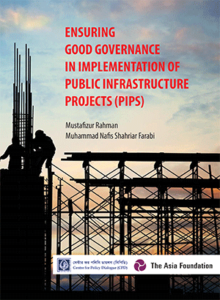 Economic and social infrastructure is one of the key foundations that drive the development of any country. Broadly speaking, infrastructure is defined as the basic systems and structures and facilities and services which are required for smooth operation of an economy, at various levels. It will not be an exaggeration to state that an economy’s growth and sustainability of growth hinge critically on the state of its infrastructure (Ziara & Ayyub, 1996). Indeed, infrastructure system that include basic facilities such as energy and power, telecommunications networks, transportation facilities, water supplies and logistics and social services including health and education is the fulcrum and supporting framework on which the development structure of an economy is founded. However, as will be appreciated, building of the needed infrastructure calls for a significant amount of resources for planning, implementation and maintenance. Accordingly, issues of good value for money in infrastructure-related investment are of critical importance for any country, more particularly for resource-constrained developing countries such as Bangladesh.
Economic and social infrastructure is one of the key foundations that drive the development of any country. Broadly speaking, infrastructure is defined as the basic systems and structures and facilities and services which are required for smooth operation of an economy, at various levels. It will not be an exaggeration to state that an economy’s growth and sustainability of growth hinge critically on the state of its infrastructure (Ziara & Ayyub, 1996). Indeed, infrastructure system that include basic facilities such as energy and power, telecommunications networks, transportation facilities, water supplies and logistics and social services including health and education is the fulcrum and supporting framework on which the development structure of an economy is founded. However, as will be appreciated, building of the needed infrastructure calls for a significant amount of resources for planning, implementation and maintenance. Accordingly, issues of good value for money in infrastructure-related investment are of critical importance for any country, more particularly for resource-constrained developing countries such as Bangladesh.
One distinctive feature concerning investing in infrastructure is that it involves a high possibility of market failure since many of these are of public goods type by nature and private sector may not necessarily come forward to invest in those i.e., investment in infrastructure will be lower than the optimal level if it is left to market forces alone. The pay-off period for many infrastructure projects tends to be rather long, and also the returns from investment can be uncertain. The public good nature of infrastructure often necessitates governments to come forward to invest in infrastructure, either singly or in partnership with the private sector or with aid money. In varying degrees, in almost all countries, the public sector is significantly involved in investing in infrastructure projects, on its own or as a key partner.
In view of the above, ensuring good governance in the implementation of public infrastructure projects (PIPs) has emerged as a key concern in developing countries such as Bangladesh. And, in this backdrop, there is a need for a suitable framework which would enable concerned stakeholders to assess and monitor the state of good governance in PIP implementation.
Authors: Mustafizur Rahman and Muhammad Nafis Shahriar Farabi
Publication: June 2022



